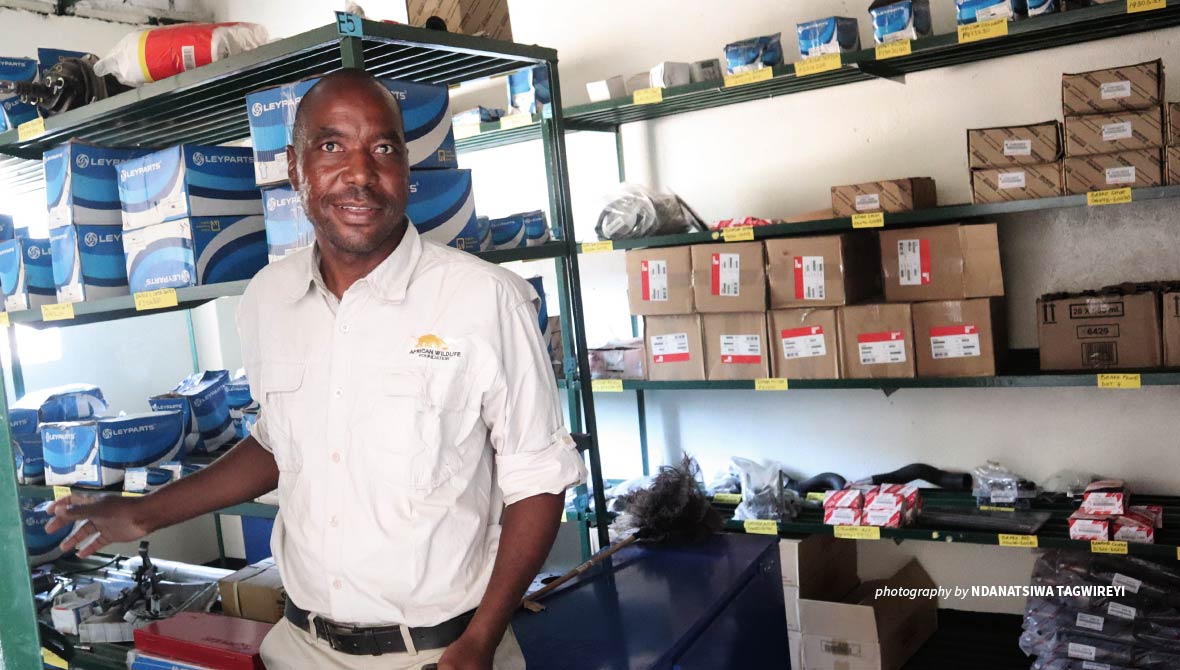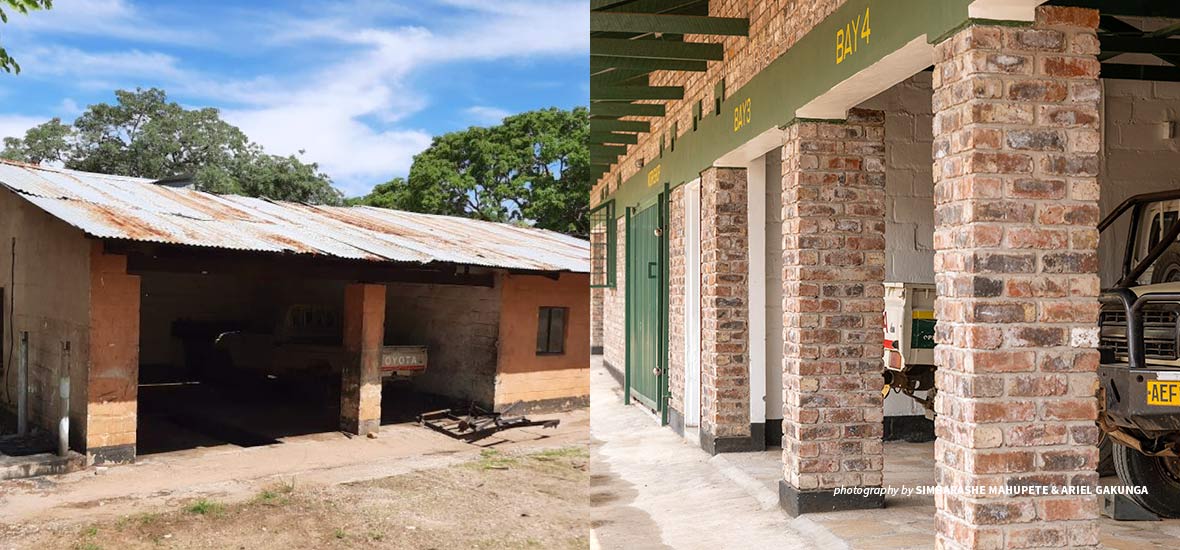This expert motor mechanic is conserving Zimbabwe’s wildlife heritage

AWF's Simbarashe Mahupete manages a workshop in the Mid Zambezi Valley, maintaining anti-poaching vehicles operating across the landscape
Chance Conservationists is a series highlighting AWF staff who have embraced people-centered conservation in their professions despite coming from diverse academic fields. These remarkable individuals now espouse conservation values to propel the organization’s vision for sustainable development and biodiversity protection.
Although his skills were highly valued in eastern Afghanistan, where he worked as a maintenance manager at Automotive Management Services for six years, Simbarashe Mahupete’s patriotic spirit compelled him to return home to Zimbabwe. He has since channeled his expertise toward wildlife conservation as part of the African Wildlife Foundation (AWF) team working in the Mid Zambezi Valley landscape.
His birth in 1980 coincided with Zimbabwe’s attainment of independence. Growing up in the small town of Chivhu, in Mashonaland East Province, Mahupete says his love for wildlife spans from childhood, although he only learned about the Big Five from reading textbooks and watching television.
Prior to his work adventure in Afghanistan, Simbarashe trained as an apprentice in motor vehicle mechanics with Amalgamated Motor Corporation and graduated in 2005. He worked at the company till 2008 before joining Croco Motors as a Senior Technician and rising to become the Workshop Supervisor. During the same period, he went through the Ford Master Technician certification and got certified as Master Technician.
The adept motor mechanics professional with over 15 years of experience says he is driven by his desire to practice his profession in his home country and his passion for contributing towards conserving Zimbabwe’s wildlife heritage. Mahupete joined AWF in 2020 as a Vehicle Workshop Manager at the Zimbabwe Parks & Wildlife Management Authority (Zimparks) Marongora field station in the Mid Zambezi Valley, a prime wildlife conservation landscape in Zimbabwe. Immediately, he was faced with the mammoth task of facilitating the renovation of the Zimparks Automobile Workshop, which services anti-poaching vehicles for all Zimparks stations located within this landscape.
New workshop ensures effective anti-poaching operations
The old satellite vehicle workshop consisted of a dilapidated building and disused facilities without basic water and sanitation facilities to run efficiently as a vehicle service center. The workshop infrastructure was taken down and renovated into a modern facility complete with offices, ablution facilities, engine hoisting ramps, a pit, vehicle spare parts, and storage rooms. Mahupete oversaw the transformation of existing buildings into a new state-of-the-art workshop, pivotal in servicing vehicles from 11 stations in the Mid Zambezi region, thanks to the AWF and Zimparks partnership with support from the Dorothy Batten Foundation.
The workshop was also re-tooled and re-stocked with all essential workshop parts to enable smooth and effective maintenance of the vehicles. It was handed over to Zimparks in December 2021 to aid in the fight against poaching and wildlife trafficking in the Mid Zambezi region.
“When I joined AWF, the vehicle workshop structure was too old, with the roof collapsing and walls broken. The general workshop area had equipment and broken-down vehicles everywhere, so this needed to be sorted out,” he reminisced.
The nature of the terrain blocked big trucks from delivering building materials to the construction site. The materials had to be dropped far away, requiring a tractor to transport them to the construction site and additional workforce for loading and offloading.
“My role was to mobilize building material, monitor the builders so that the refurbished structure could meet the expected standard, and decontaminate the workshop area of spilled lubricants and rearrange equipment around the general workshop area,” he said, paying tribute to the unwavering support he received from other AWF field staff members.
Under Mahupete’s leadership, the vehicle workshop has attended to over 160 vehicles to date, a development which he believes has enabled Zimparks law enforcement personnel to respond swiftly to wildlife threats and illegal activities within the protected areas as the fleet of vehicles in the landscape is now ever ready for deployment.
In the past, Zimparks used to take its vehicles for service and repair in Harare, approximately 340 kilometers from the landscape. Zimparks Mid Zambezi Valley Regional Manager Felix Chimeramombe explained during the Mid Zambezi media tour held in November 2022: “As Zimparks, we are now saving quite a substantial amount of money for the servicing of our vehicles. In the past, we used to take our vehicles to private garages in Harare and pay for the services, but right now, we are doing everything related to vehicle service here on site without traveling long distances through AWF’s support.”
According to Mahupete, “Vehicle breakdowns have been eliminated and the turnaround time significantly reduced since the workshop has parts available for repairs to be done timeously. Systems were put in place such that we properly control and monitor parts inventory as well as discharging our fleet maintenance mandate in a professional manner.”

Before (left) and after the renovation of the vehicle workshop
At the interface of motor mechanics and wildlife conservation
On a typical day, the workshop manager drives 72 kilometers to and from the workstation and works with a team of three Zimparks personnel comprising two trainees and a welder. He simultaneously provides maintenance to the Mid Zambezi region vehicles and mentors these trainees daily. Additionally, Mahupete is responsible for supporting satellite workshops in the Zambezi Valley by ensuring the proper diagnosis of vehicles before ordering the necessary parts.
He has also played a key role during visits by high-level delegates to the Mid Zambezi Valley region, including the recent Lower Zambezi Mana Pools Trans-Frontier Conservation Area (LOZAMAP TFCA) tour and the Mid Zambezi Valley Media tour conducted last November, among others. He passionately explains how the workshop operates and its impact in the Mid Zambezi region, courtesy of the partnership between AWF and Zimparks.
Other days require him to attend to vehicle breakdowns within the Mid Zambezi Valley landscape.
“The number of vehicles we attend to on a weekly basis varies from four to six, and the work done on them also varies from routine maintenance to repairs. This workshop has the capacity for component overhauling, and to date, we overhauled an engine and a transmission assembly,” the adept motor mechanic said. “We are involved in fabrication and welding of materials that may be required by other departments like security screens and burglar bars.”
Due to his dedication to work and the tangible impact seen on the ground, AWF awarded him with a special bonus. This long-overdue gesture recognizes the interface between motor mechanics and wildlife conservation.
“It was a big surprise to me, and it challenged me to even do better knowing that the organization appreciates and rewards good work,” an elated Mahupete said.
The Marongora Vehicle Workshop Manager enjoys overcoming challenges and is optimistic that he will continue to implement more strenuous projects in the future. His word of advice to upcoming motor mechanics professionals who wish to excel in any sector: “One needs to be dedicated, faithful, focused, and should possess self-confidence and a positive attitude because some missions will appear impossible before attempting.”